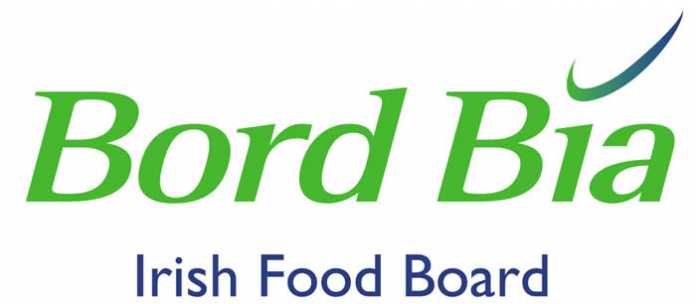
BORD Bia has announced details of its ‘Navigating Change’ COVID-19 marketing supports response strategy in response to the impact the CVOID-19 crisis has had on the nation’s largest indigenous sector as well as announcing a €1 Million marketing grant scheme.
The programme includes bespoke supports for producers and food and drink manufacturers, alongside the supports offered by the Department of Agriculture, Food and the Marine and Government Supports for Business.
Tara McCarthy, CEO Bord Bia said the Navigating Change supports “are highly tailored to tackle the specific impacts the COVID-19 crisis is having on the Irish food, drink and horticulture industry”.
The supports are framed around an expert report released today detailing the extent of the economic shock due to the DOVID-19 disruptions.
A new Navigating Change hub has been developed for the Bord Bia website where industry can access details of grants, up-to-the-minute market insights, business supports, expert webinars and podcasts.
Ms McCarthy said, “A core dynamic has emerged whereby food and drink companies are seeing a dramatic reduction in demand from foodservice customers countered by spiking demand in retail, for different products.
“At the same time, factory floor constraints, supply chain challenges and varying international market dynamics all have the potential to cause significant disruption.”
The Bord Bia CEO acknowledged the COVID-19 pandemic brings an “unprecedented challenge” to the industry, saying, “the scale and enormity of the challenges we face are changing rapidly and so too must our supports.”
Bord Bia has also announced a €1m marketing grant scheme for manufacturers to assist accelerate eCommerce and expand marketing activities in the context of rapidly changing trading conditions.
The deadline for applications for the marketing grant is Thursday, April 16, 2020.
The scale of the challenge
Bord Bia’s detailed Navigating Change report indicates COVID-19 is affecting all aspects of the Irish food and drinks industry, but the impact is very different across sectors. Key trends identified are:
- Retail / foodservice see-saw effect: The foodservice industry is the most severely impacted, experiencing a near-total collapse in demand due to the temporary shutdown of the hospitality sector. Lost sales are running at an estimated €6.9bn for some of Europe’s largest foodservice markets (Germany, France, Italy and Spain). Retail and grocery, meanwhile, is experiencing dramatic increases in demand. However, with significant redundancies across Europe and the US, medium-term consumer spending in retail is projected to reduce from current peaks as consumers’ disposable income is potentially impacted.
- Sector impact: At producer level, the crisis is impacting on various sectors in very different ways. The beef sector is experiencing ‘carcass imbalance’ wherein consumer demand for lower value cuts like mince is increasing while demand for higher value steak cuts – often sold to foodservice restaurant customers – is falling sharply. Milk processing in the dairy sector is continuing under strict physical distancing procedures. Fall-off in demand in foodservice has been replaced by consumer demand through retail. Cold storage facilities for products is increasingly difficult and costly to obtain which may pose problems as the sector enters peak milking season.
- Prepared Consumer Foodsmanufacturers that are foodservice focused have been most strongly affected to date while retail sales have performed well in most cases, although some products have been affected by the focus on core products by retailers.
- Alcohol has witnessed a severe fall off in the on-trade and travel retail although some of this loss has been alleviated by a strong pick up in the off trade. A number of distilleries have commenced producing hand sanitisers over recent weeks to utilise capacity. Logistics remain one of the key challenges facing the seafood sector. It has become more costly to service export markets with many lorries only partially filled while getting products to Asia has become a major challenge due to the shortage of reefer capacity. The loss of the foodservice sector is negatively impacting on demand across Europe.
- Cina reawakening: As of last week, China’s economic capacity utilisation rate had recovered to 78% of pre-COVID-19 levels. While COVID-19 impacts are expected to linger into June, recovery is expected to be well under-way by the second half of 2020. 90% of foodservice outlets have reopened and the Bord Bia China team are tracking market movements closely.
Bord Bia: Navigating Change COVID-19 Response Strategy: In response to these market conditions, Bord Bia’s bespoke industry-wide COVID-19 response for the food, drink and horticulture sector is built around three key focus areas:
- Understanding:
- Bord Bia will keep clients up-to-date on the impact of COVID-19 on worldwide trade and the implications for Ireland through 1. the Bord Bia Thinking House which charts consumer insights; 2. the Bord Bia Markets Team which offers global perspectives on international trade and critical issues like global supply chain challenges and 3. the Bord Bia Sectors Team offering up-to-date sectoral intelligence to manufacturers.
- A regular ‘Navigating Change: Markets Focus Report’ will be published bi-weekly detailing supply and demand trends and implications across the supply chain worldwide along with podcasts throughout the week.
- Client Supports:
- Bord Bia has instigated a number of COVID-19 related supports including: a €1m marketing grant programme to help Irish producers generate demand in a rapidly changing landscape; Training and mentoring programmes including Navigating Change Supply Chain Mentoring, Lead Generation in a Changed Landscape, Think Digital training programme.
- Bord Bia has made immediate and practical changes to Origin Green and Quality Assurance audit procedures during the COVID-19 crisis
- Bord Bia continues to engage closely with retailers on the Irish market to share supplier challenges and identify new opportunities for companies who can fill supply gaps and provide a compelling offer to consumers.
- Future-Proofing:
- When the immediate and severe impacts of COVID-19 abate, food and drink companies must start planning for a post COVID-19 future. This is a key aspect of Navigating Change and Bord Bia will provide specific supports throughout this crisis – bespoke to each phase so clients can adapt to new market conditions; recover and reset.
- With over 3.5 billion people now in lockdown, many new behaviours are being forced upon consumers, experimented with, and are bringing new learnings for businesses worldwide. Understanding consumer behaviour is a critical part of enabling businesses to plan ahead appropriately and to move forward with confidence post COVID-19. According to research in the University of London, it takes 66 days to change a habit and so in tracking how people behave during this crisis, it will allow Bord Bia identify new behavioural norms that are likely to emerge.
- Indicators tracking, from the Thinking House at Bord Bia, is designed with this intent; to allow businesses understand the behavioural changes that are unfolding. These indicators will allow Bord Bia to map out the big shifts in consumer behaviour that are manifesting themselves during the crisis with a view to understanding behaviours that are likely to “stick” and emerge post crisis. Consequently, they allow Bord Bia to start identifying the implications these newly formed behaviours will have for food and drinks businesses going into the future.
- Indicators will focus on themes including; how consumers are cooking to how people are socialising. The first four Indicators; “Shielding”; “Comfort Cooking”; “Trace Tech” and “Simply Safe” are available
Full details of Bord Bia’s Navigating Change COVID-19 Response programme and suite of supports is available at: https://www.bordbia.ie/industry/COVID-19-information/.


